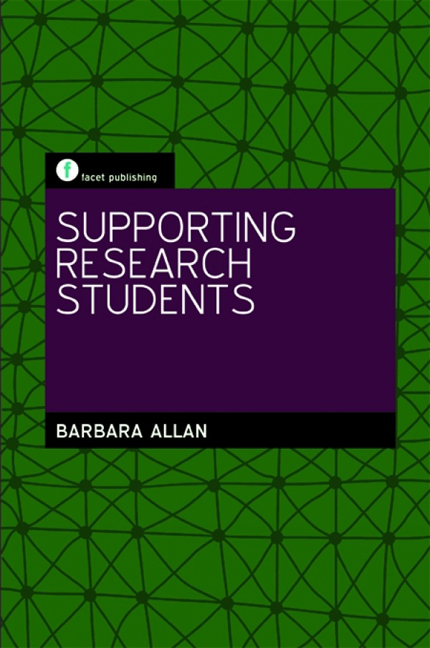Book contents
- Frontmatter
- Contents
- List of figures
- List of tables
- Acknowledgements
- 1 Introduction
- 2 Research and the research process
- 3 The research student's experience
- 4 Moving forward and completing the research
- 5 Research skills training
- 6 Supporting research students in academic libraries and information services
- 7 Virtual graduate schools
- 8 Introduction to research communities
- 9 Professional development
- Conclusion
- References and bibliography
- Index
7 - Virtual graduate schools
Published online by Cambridge University Press: 09 June 2018
- Frontmatter
- Contents
- List of figures
- List of tables
- Acknowledgements
- 1 Introduction
- 2 Research and the research process
- 3 The research student's experience
- 4 Moving forward and completing the research
- 5 Research skills training
- 6 Supporting research students in academic libraries and information services
- 7 Virtual graduate schools
- 8 Introduction to research communities
- 9 Professional development
- Conclusion
- References and bibliography
- Index
Summary
Introduction
The aim of this chapter is to present and explore the idea of supporting research students in a virtual graduate school (VGS). The concept of a VGS is an online environment where research students can come together to access a range of resources, to meet and discuss common issues with each other and perhaps with their supervisors. Different approaches to developing a VGS are explored in some depth.
The development of virtual graduate schools
The concept of a VGS has developed as a result of a number of drivers, including:
■ the need to support research students and encourage them to complete their degrees
■ the need to provide students with access to a community where they can make friends, share ideas and learn from each other
■ recognition that there may be research students in different faculties and departments who are grappling with the same methodological issues as their peers in other parts of the university and who welcome the opportunity to share their experiences and ideas
■ the benefits of capturing and sharing the experiences of researchers (including students, contract staff and academics)
■ the need to support and provide flexible research skills training
■ the availability of virtual learning environments
■ the availability of online tools, including Web 2.0 social networking and other tools.
Behind the development of a VGS there is often recognition that the research student experience is a very individual one and that some students may work in isolation and find it difficult to become part of a research community. This may be because there are small numbers of research students in their department or faculty, they may be distance research students, or they may be working away from their campus, e.g. doing fieldwork. The idea of developing a virtual community with access to discussion groups is an attractive one, as it suggests the possibility of developing online communities of research students and staff. Also, research students in different departments or faculties may be working on the same methodological issues, e.g. research students in education and in management may be using an action research approach to their work, or students in gender studies and leadership may be using discourse analysis. The idea of enabling students from different departments and faculties to work together is attractive, as it suggests that students may learn from each other by sharing resources and ideas.
- Type
- Chapter
- Information
- Supporting Research Students , pp. 123 - 140Publisher: FacetPrint publication year: 2009



